

How to become a fast learner? Is this something mostly genetically predisposed? Are there any materials (or a list of them) that one can use for reference. Channel 4 - If The King's Speech was set in Yorkshire...... How to Get Excited About Topics That Bore You. Executive Summary The ability to develop new skills – and new passions — is particularly important in today’s fast-paced business climate.
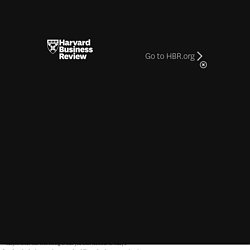
TEDxOaklandUniversity. How to Learn Faster with the Feynman Technique (Example Included) Ww2.kqed. What Can People Do to Get Better at Learning?
Scientists have found a way to help you learn new skills twice as fast. How Lucid Dreaming Can Improve Your Motor Skills. Mental training is arguably as important as physical fitness.
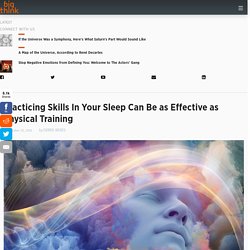
That argument is gaining strength as a growing body of literature unravels the once-mysterious connections between consciousness and movement. We know that the murky domain of subconscious and autonomic actions greatly influences our waking lives. How to Learn Faster with the Feynman Technique (Example Included) Why We Only Learn When We Repeat. How to Learn Faster with the Feynman Technique (Example Included) Quora. Big Think Video - Learn about the 10 most popular learning... Learning How to Learn: Powerful mental tools to help you master tough subjects.
This course gives you easy access to the invaluable learning techniques used by experts in art, music, literature, math, science, sports, and many other disciplines. We’ll learn about the how the brain uses two very different learning modes and how it encapsulates (“chunks”) information. We’ll also cover illusions of learning, memory techniques, dealing with procrastination, and best practices shown by research to be most effective in helping you master tough subjects. Untitled. To master any skill, use the learning technique that scared Bruce Lee — Quartz. Constant interruptions are the bane of life in today’s open-plan offices.
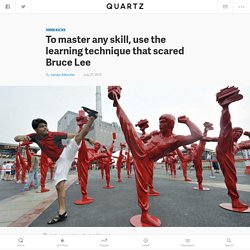
And a Swedish-Swiss industrial engineering company, ABB, says it has a solution: It has given some of its employees a kind of automated “do not disturb” sign: custom-designed traffic lights for their desks. The FlowLight system evaluates how busy someone is by measuring their combined mouse and keyboard activity against that person’s baseline average. When activity is in the top 9% of their typical range, the light turns red, letting colleagues know that it’s the wrong time to amble over with a funny anecdote or any question that’s not absolutely burning. Non-emergencies can wait until the light is green. Why am I so bad at math? You're not, you're just looking at it wrong. — Quartz. What does mathematics look like to you?
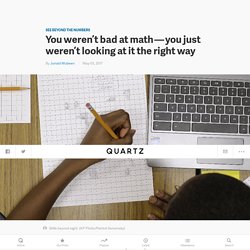
Do you see a wondrous landscape filled with connected ideas, or a sprawling mess of symbols? The distinction matters a great deal, because your mathematical worldview is inextricably tied to your success in the subject. We are all familiar with the multiplication grid, a centerpiece of classrooms and home studies the world over: You cannot fault this image for accuracy.
A Stanford researcher's 15-minute study hack improves test grades by a third of a grade — Quartz. How Elon Musk learns faster and better than everyone else — Quartz. This past weekend Donald Trump praised his Chinese counterpart for his efforts to address the increasingly tense situation on the Korean peninsula.

The US president said Xi Jinping “is working to try and resolve a very big problem, for China also.” That problem, of course, is the ongoing development of ballistic missiles and nuclear weapons by North Korean dictator Kim Jong-un, despite UN sanctions. Kim seems hellbent on being able to hit North America with nuclear-tipped missiles, and some analysts think he’s only a few years away from it. Trump suggested he might be willing to meet Kim under the right conditions, echoing sentiments from secretary of state Rex Tillerson that the US is open to direct talks with North Korea as long as the agenda is a “denuclearized Korean peninsula.”
Fear of military force is unlikely to bring North Korea to the table, if the past half century or so is anything to go by. The Secret to Learning Anything: Albert Einstein’s Advice to His Son. Here comes a fine addition to history’s greatest letters of fatherly advice from none other than Albert Einstein (March 14, 1879–April 18 1955) — brilliant physicist, proponent of peace, debater of science and spirituality, champion of kindness — who was no stranger to dispensing epistolary empowerment to young minds.
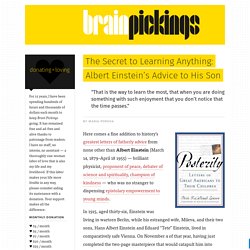
In 1915, aged thirty-six, Einstein was living in wartorn Berlin, while his estranged wife, Mileva, and their two sons, Hans Albert Einstein and Eduard “Tete” Einstein, lived in comparatively safe Vienna. My dear Albert, Yesterday I received your dear letter and was very happy with it. I taught my 5th-graders how to spot fake news. Now they won’t stop fact-checking me. It was a fall day in 2014, and my classroom was full of excitement.
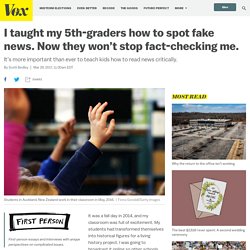
My students had transformed themselves into historical figures for a living history project. I was going to broadcast it online so other schools could watch our “Age of Exploration News Conference” live. One half of the class researched and dressed up as European explorers like Christopher Columbus. The other half acted as news reporters from all the major outlets ready with questions. #TEDEdChat: New experiments in self-teaching. TED-Ed - How to practice effectively ... for just about... The Lesson You Never Got Taught in School: How to Learn! A paper published in Psychological Science in the Public Interest evaluated ten techniques for improving learning, ranging from mnemonics to highlighting and came to some surprising conclusions.
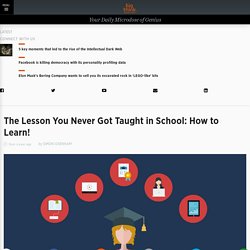
The report is quite a heavy document so I’ve summarised the techniques below based on the conclusions of the report regarding effectiveness of each technique. Is it okay to spend money on books instead of getting them from the library? — Quartz. Constant interruptions are the bane of life in today’s open-plan offices.
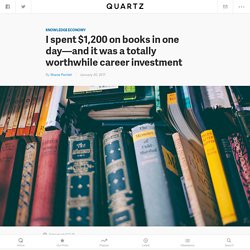
And a Swedish-Swiss industrial engineering company, ABB, says it has a solution: It has given some of its employees a kind of automated “do not disturb” sign: custom-designed traffic lights for their desks. The FlowLight system evaluates how busy someone is by measuring their combined mouse and keyboard activity against that person’s baseline average. When activity is in the top 9% of their typical range, the light turns red, letting colleagues know that it’s the wrong time to amble over with a funny anecdote or any question that’s not absolutely burning. Non-emergencies can wait until the light is green. How to read 200 books a year — Quartz.
4.
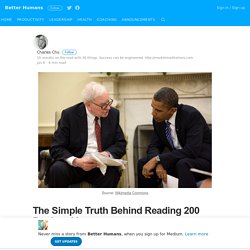
Execute We all know reading is important. We all know we should do more of it. Untitled. Power Searching. Mental Models List – Medium. 8 Programs to Help You Learn - Medium. 8. Curious Grow your skills with 15,000 lessons in tech, business, and more. Curious starts with a questionnaire that measures your interest in eight different areas: work, play, mind/body, relationships, humanities, STEM, aesthetic, and music. All of these areas and their subsets combine to give you access to over 15,000 bite-sized lessons. You can learn about American history one day, and advertising the next. Free websites and apps to learn something new - Medium.
This article was originally published in my private newsletter. Once upon a time, if you wanted to learn something, you had to a) pay a bunch of money, and b) go to a school or classroom, a place specifically dedicated to learning. Those days are over. Now, a profusion of apps, websites and institutions offer us a wider variety of (often superior) educational experiences than ever before- and we can access them from anywhere in the world, often for free.